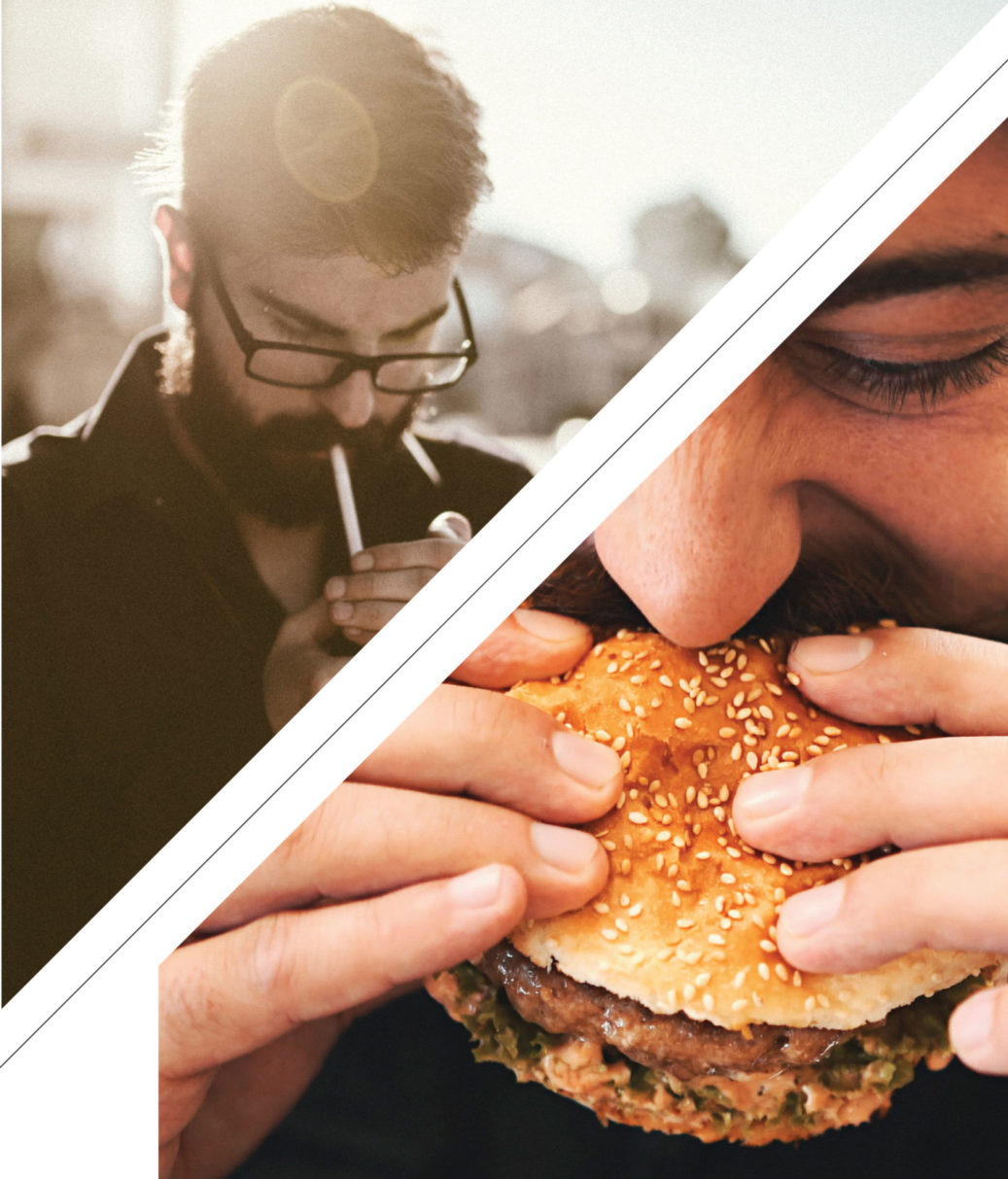Double Standards and the Call to Healthy Living
Imagine yourself in the following scenario: you and a group of friends are out at a restaurant or pub enjoying some food and maybe a few refreshments. Everyone is having a great time, when one member of the group excuses himself to step outside.
“I’ll be back in a minute—just grabbing some ‘fresh air.’”
We all know what this means. Our friend has removed himself from the conversation to facilitate their dirty, disgusting, degrading smoking habit, and within a few minutes will return only to subject us to the stench of their smoke-ridden clothes and ashtray breath.
“Seems like a lot of trouble just to kill yourself,” we think to ourselves.
“I can’t believe anyone still does that,” we say to our other friends as the smoker leaves the table.
“Have you ever tried quitting?” we ask upon return, perhaps even out of genuine concern.
“It’s just so bad for you,” we say, knowing that our smoker friend will clearly see the error of their ways…
Maybe the conversation doesn’t play out exactly this way in your particular circles, but it’s still true that we tend to judge smokers pretty harshly for their habits, especially nowadays. With all we know about how much harm smoking can do to your body, it’s hard not to speak up when we see a friend or family member subjecting themselves to something so medically hazardous. You might even say we have a responsibility to try to get people like these to clean themselves up.
Perhaps you’ve even been that person—the family member stepping outside while everyone else in the room manages their discomfort and tries to come up with something not too belittling, but still somewhat scolding, to say to you. Maybe you’ve been the friend who keeps doing the thing you know is bad for you, no matter how bad the people around you make you feel about it. Maybe you know what it’s like to feel that nagging sense of guilt or shame for succumbing to a vice you should have a handle on… but don’t.
But the thing is… why are we only talking about smoking here?
More and more doctors are saying that obesity can be just as hazardous, if not more so, than smoking. A 2015 study from Harvard University predicted that in just ten years, obesity will cause more cancers than tobacco usage in the United States and United Kingdom, and is already responsible for roughly 32,000 deaths each year in the UK alone.
Whereas the rates of male smokers has declined from 70 per cent down to about 20 since the 1960s, the rate of obesity has risen to the point where two-thirds of British adults are now considered overweight or obese, according to a report from The Guardian back in 2014. In Canada, those statistics are only slightly more positive.
According to Forbes, Canada ranks as 33rd on a list of the fattest countries on Earth, though that list is already more than ten years old. The most recent survey results from StatsCan tell us that more than 14 million Canadians over the age of 18 identified as being overweight or obese back in 2014, roughly 54 per cent of the population.
Who decides that killing your body with tobacco is worse than killing your body with trans fats?
However, those stats are self-reported, meaning that they could be lower if we truly have been our own worst critics. But based on how little you might anecdotally hear about obesity as a serious health concern, my guess is that it’s likely higher.
“While one burger is not bad for you in the same way that one cigarette is, producers of bad food must be made ashamed for poisoning our bodies,” writes Denis Campbell, a health policy editor for The Guardian.
Words like these seem to suggest that the burden should fall more on the food producers for putting unhealthy meal and drink options in front of us, the consumer. And it’s an interesting thought to consider public service advisors going after the perpetrators of bad diets in the same way they targeted tobacco companies in decades past.
But again, we do the wrong thing all the time. So maybe it is our problem.
It’s an odd thing to consider how we might chastise the smoker for filling himself with poison, while at the same time giving the glutton a free pass for doing basically the same thing. We feel emboldened to call out the smoker, while scolding the glutton seems somehow out of line. But why is this? Why do we stigmatize one group to such a greater extent than the other? Why are only some vices worth getting worked up about? And what are the flaws that you’re willing to overlook when it comes to calling out your friends?
Generally speaking, this should not come as a surprise—we do this all the time. We as Christians have long been big supporters of a multi-tiered system of judgment. No one questions the truth of “thou shalt not steal,” but very few seem to show the same concern when a friend lends them a USB stick jam-packed with the latest bootlegged season of their favourite show. There are plenty of sins—things like greed, envy, and covetousness—that we ignore, normalize, or even celebrate within our culture.
We look at someone who’s never satisfied with where they are or what they already have and say, “There’s a guy that’s driven to succeed.”
We see the guy who’s first in and last out at the office and admire him for having a ‘good work ethic,’ even if it comes at the expense of his relationship with his wife and kids at home.
A man who’s ambitious and a man who’s ungrateful can, and often are, the same person. Maybe those big dreams are the natural tendency of someone who hasn’t learned to stop and say, “Thank you.”
Obviously, nobody mentioned above should be considered a ‘bad person.’ Most days, we’re all just trying to do our best. But we’re left with an interesting logical conundrum if we suddenly decide to convict some for their sins and let others slide. The whole concept of sin becomes pretty arbitrary when we start creating a ‘some sins are not as sinful as others’ outlook to how we hold each other accountable.
Who decides that killing your body with tobacco is worse than killing your body with trans fats?
When we ask the question of why we let certain sins go unchecked, it should be pretty obvious: because we’ve always done it. We’re experts at pointing at specks while leaving our own ocular logs right where they are. But how do we proceed from here? Do we advocate for a system of hyper-legalism wherein we chastise everyone for everything all the time? Or do we just stop caring about everything and let everybody off the hook?
It’s probably more helpful to understand why taking care of our bodies is not just a good thing to do, but a godly thing to do.
Here’s the thing—if you eat poorly, you’re probably going to die sooner than if you eat healthy, simple as that. If you smoke, it’s the same thing. But it can be difficult to know how much of that commitment to bodily health is biblical and how much is cultural, when you consider that the standard of health and/or beauty can vary widely depending where in the world you are. Being ‘overweight’ in one country might just mean ‘not starving to death’ in another.
It can be really difficult to see the line between making healthy choices for the sake of “honouring God with your body” (1 Corinthians 6, which, it should be noted, is part of a passage referring specifically to sexual immorality), and making healthy choices for the sake of having a ‘rockin’ beach bod.’”
It gets especially hard to start making biblically defined statements about gluttony when a lot of the verses that speak against it have as much to do with the idolatry of eating than eating itself. Take For example, a verse like Philippians 3:19 which says:
“They are headed for destruction. Their God is their appetite…”
It might be easy to read these and appropriate a verse like this towards some culturally motivated commitment to fitness, but taken in context, these words seem to suggest something bigger than just being fat.
Paul tells the church in Philippi that he himself, even as an apostle of Christ, has not reached the perfection to which he tells others they should strive. But at the same time, he tells the Philippians that they should press on and not give up on the call of Christ Jesus.
“For I have told you often before, and I say it again with tears in my eyes, that there are many whose conduct shows they are really enemies of the cross of Christ. They are headed for destruction. Their god is their appetite, they brag about shameful things, and they think only about this life here on earth. But we are citizens of heaven, where the Lord Jesus Christ lives. And we are eagerly waiting for him to return as our Saviour. He will take our weak mortal bodies and change them into glorious bodies like his own, using the same power with which he will bring everything under his control.” (Philippians 3:18-21)
Verses like this are about idolatry, not about feeling good about the way you look without a shirt on. Paul is not using the “enemies of the cross” to make a point about aesthetics or even health, but to highlight that even food can become an idol that we place on a higher level than Christ.
Similarly, verses like Ezekiel 16:49-50 seem to point to a larger problem than simple overeating: “Sodom’s sins were pride, gluttony, and laziness, while the poor and needy suffered outside her door. She was proud and committed detestable sins, so I wiped her out, as you have seen.”
This passage comes after a long section that once again touches on idolatry and the prostitution and unfaithfulness of Israel. So for us to point to a text like this and say, “You see? Gluttony is a sin!” seems to be, at the very least, missing the greater picture. We can’t focus on gluttony in the first half of verse 49 and at the same time ignore the pride and contempt for the poor and needy in the second half.
Eating too much, like anything we can do excessively, can and often does become a problem when it becomes an idol. Anything that takes the place of God in our lives needs to be checked and reigned in. You might argue that a fitness routine could do the same thing. When you’re more committed to a waist size than you are to worship, it’s probably a sign that your priorities need to be re-evaluated.
But make no mistake; health isn’t something to be taken lightly. We’ve been granted life for the purpose of honouring God and loving our neighbours. Anything we do that takes that for granted seems to run the risk of dishonouring the gifts we’ve given, and of seeing life as ours to do with what we please and not something we’ve been given by God for His purposes. We should take care of ourselves—not because we ought to care what our society deems beautiful or ugly, but because we’re not meant to be under anyone’s control but the God we serve.
Your body, whether you care about it too much or too little, is not yours to throw away.
About


